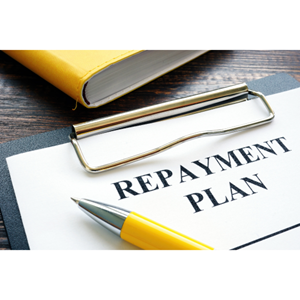 Managing multiple debts can be surprising and stressful, but with careful planning and a strategic debt consolidation and repayment plan, you can regain control of your financial situation. Consolidating your debts and creating an effective repayment strategy simplifies your financial obligations and helps you save money on interest payments and ultimately become debt-free. The initial step in managing multiple debts is to assess your financial situation. Collect all the necessary information about your debts, including pending balances, interest rates, and minimum monthly payments. It will provide a comprehensive overview of your debt landscape, allowing you to make informed decisions about consolidation and repayment.
Managing multiple debts can be surprising and stressful, but with careful planning and a strategic debt consolidation and repayment plan, you can regain control of your financial situation. Consolidating your debts and creating an effective repayment strategy simplifies your financial obligations and helps you save money on interest payments and ultimately become debt-free. The initial step in managing multiple debts is to assess your financial situation. Collect all the necessary information about your debts, including pending balances, interest rates, and minimum monthly payments. It will provide a comprehensive overview of your debt landscape, allowing you to make informed decisions about consolidation and repayment.
Once you clearly understand your debts, it’s time to create a budget. A budget helps you identify your income, expenses, and savings goals. It lets you determine how much money you can allocate towards monthly debt repayment while meeting your essential needs. A well-planned budget also helps you identify areas where you can cut back on expenses, freeing up more funds to tackle your debts.
Debt consolidation is a valuable strategy for managing multiple debts. It will combine all your debts into a single loan amount at a lower rate. It simplifies the repayment process and reduces the likelihood of missing payments or incurring additional fees. Various debt consolidation options are available, such as personal loans, balance transfers, or home equity loans. Carefully evaluate each option’s terms, interest rates, and fees to select the most suitable one for your circumstances.
In addition to debt consolidation, prioritizing your debts is crucial. High-interest debts should be your primary focus, as they accumulate more interest over time. By allocating more of your available funds towards these debts while making minimum payments on others, you can minimize the interest you pay and accelerate your journey toward debt freedom.
Maintaining discipline and tracking your progress are essential components of managing multiple debts. It requires consistent budgeting, responsible spending, and a commitment to your repayment plan. Staying motivated is key, and celebrating small victories can help you stay on track.
If you struggle with managing multiple debts, seeking professional help from a credit counsellor or financial advisor is a wise decision. They can provide expert guidance, assist you in creating a customized debt repayment strategy, and offer valuable insights to navigate challenging financial situations.
Debt Management Plan

A debt management plan (DMP) is a structured approach to managing your debts and establishing a clear path toward becoming debt-free. It involves working with a reputable credit counselling agency to create a plan that suits your financial situation and helps you repay your debts effectively.
The first step in developing a debt management plan is to consult with a credit counsellor. They will assess your financial situation, including your income, expenses, and debts, to understand the extent of your economic challenges. Based on this evaluation, they will work with you to create a personalized plan.
Once the plan is established, the credit counselling agency will negotiate with your creditors on your behalf. They will aim to lower interest rates, eliminate or reduce late fees, and establish a more manageable repayment schedule. This negotiation process can help you save money and make your monthly payments more affordable.
Under the debt management plan, you will pay the credit counselling agency monthly, which will divide the funds among your creditors with respect to the negotiated terms. It will simplify your financial obligations and ensures your payments are made on time. It also relieves the stress of managing multiple creditors and eliminates the risk of missed or late fees.
You must make consistent monthly payments throughout the DMP, which typically lasts three to five years. The credit counseling agency will provide guidance and support, helping you stay on track and adjust the plan if necessary. They will also offer financial education and budgeting resources to help you develop better money management skills for the future.
While enrolled in a debt management plan, it’s important to avoid taking on additional debts and to live within your means. This period is an opportunity to develop healthy financial habits and learn from past mistakes.
Implementing a debt management plan can give you a sense of control over your financial situation and a clear roadmap toward debt freedom. It allows you to consolidate debts, reduce interest rates, and establish a structured repayment plan. With commitment and discipline, you can successfully navigate the DMP and emerge debt-free at the end of the program.
Debt Repayment Plan

A debt repayment plan is a structured strategy for systematically paying off your debts over a specific period. Here’s how to create a debt repayment plan:
- Assess your debts: Gather information about all your debts, including outstanding balances, interest rates, and minimum monthly payments. It will help you understand the full scope of your debt and prioritize repayment.
- Set financial goals: Define your dreams, such as becoming debt-free within a certain timeframe or reducing your overall debt by a specific amount. Setting clear goals will make you motivated throughout the repayment process.
- Determine your available funds: Calculate your monthly disposable income by subtracting essential expenses from your income. It will show how much you can allocate toward monthly debt repayment.
- Prioritize debts: Decide on a repayment strategy. You can pay off debts with the highest interest rates first (the debt avalanche method) or start with the smallest debts (the debt snowball method) for a psychological boost. Pick the approach that aligns with your priorities and motivates you.
- Negotiate with creditors: Reach our creditors to negotiate lower interest rates or better repayment terms. Explain your situation and demonstrate your commitment to repaying the debts. Lower interest rates can save you money and accelerate your debt repayment progress.
- Create a budget: Develop a realistic budget that accounts for all your expenses and ensures you have enough to cover minimum payments and additional funds for debt repayment. Cut back on discretionary spending and find areas where you can save money to allocate towards your debts.
- Track your progress: Record your debt balances, payments made, and remaining balances. Regularly monitor your progress to stay motivated and celebrate milestones along the way.
- Stay disciplined: Stick to your repayment plan and avoid taking on new debts. Avoid unnecessary expenses and find ways to increase your income. Focus on your financial goals and maintain discipline throughout the repayment process.
How to Choose Your Financial Debt Advisor

Choosing the right financial debt advisor is crucial when seeking assistance with managing your debts. Here are some important key factors to look at when selecting a debt advisor:
- Credibility and Accreditation: Look for a debt advisor who is reputable and accredited. Check if they are affiliated with recognized organizations like the National Foundation for Credit Counseling (NFCC) or the Financial Counseling Association of America (FCAA). These affiliations indicate that the advisor follows ethical standards and has met certain criteria.
- Experience and Expertise: Consider the advisor’s knowledge of debt management. Find somebody with a proven track record of helping clients successfully navigate their debts. An experienced advisor will deeply understand various debt relief options, creditor negotiations, and financial strategies.
- Transparent fees: Understand the fee structure of the debt advisor before committing to their services. Ensure that their prices are reasonable and clearly outlined. Be cautious of advisors who charge excessive upfront fees or promise guaranteed results.
- Personalized Approach: Seek a debt advisor who offers customized solutions tailored to your financial situation. Debt management is not a one-size-fits-all approach, and an advisor should take the time to understand your unique circumstances and provide customized guidance.
- Clear Communication: Effective communication is vital in the advisor-client relationship. Choose an advisor who communicates, listens attentively to your concerns, and explains complex financial concepts in a way that is easy to understand. They should be helpful to your inquiries and provide regular updates on your progress.
- Client Reviews and Testimonials: Research the reputation of the debt advisor by reading client reviews and testimonials. It will give you insights into their success rate, professionalism, and customer service. Look for feedback from individuals who have faced similar financial challenges.
- Non-Profit vs For-Profit Organizations: Consider whether you prefer working with a non-profit or for-profit debt advisor. Non-profit organizations often offer free or low-cost services and are focused on assisting clients rather than generating profits. For-profit organizations may charge fees but can still provide valuable assistance if they have a strong track record.
By evaluating these factors, you can find a financial debt advisor with the knowledge, experience, and integrity to guide you toward a healthier financial future. Remember, conducting thorough research and seeking recommendations can greatly assist in making an informed decision.
Conclusion

In conclusion, managing multiple debts through consolidation and a well-designed repayment plan is essential for regaining financial stability. You can make significant progress toward debt repayment by assessing your debts, exploring consolidation options, prioritizing high-interest debts, creating a budget, negotiating with creditors, and staying disciplined. Remember to track your progress, celebrate milestones, and seek professional assistance. With determination and consistent effort, you can take control of your debts, minimize financial stress, and pave the way toward a brighter and debt-free future. Stay focused, stay motivated, and stay committed to your financial goals.
FAQS
- What are the three biggest strategies for paying debt?
-
- Stick to your budget. Choose a strategy; you will need a budget.
- Initiate an emergency savings account. There’s nothing like an unexpected car repair coming to destroy all your plans to get out of debt.
- Reduce monthly bills.
- What strategy should you use to pay off multiple sources of debt?
- Make a minimum monthly payment on each, but throw all your extra cash at the highest-interest debt.

